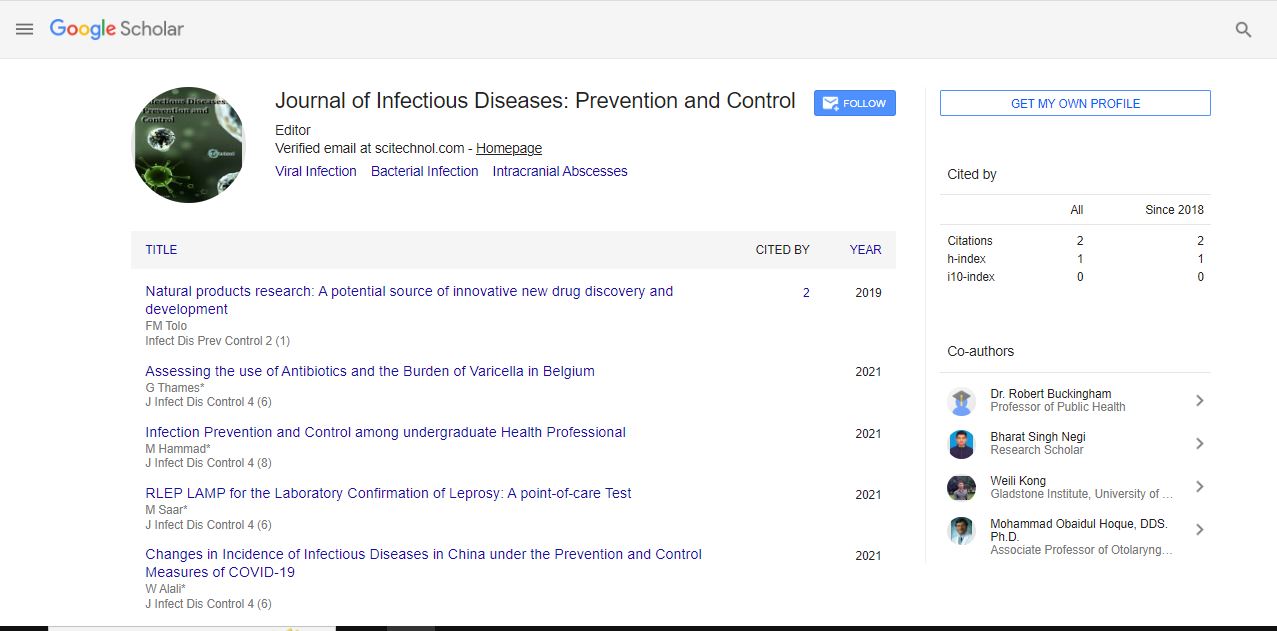Perspective, Infect Dis Prev Control Vol: 6 Issue: 4
Exploring Alchemical Transformations in Microbiology
Weissfeld Gilad*
1Department of Medical Microbiology, University of Groningen, Groningen, The Netherlands
*Corresponding Author: Weissfeld Gilad,
Department of Medical Microbiology,
University of Groningen, Groningen, The Netherlands
E-mail: weissgila@rug.nl
Received date: 24 November, 2023, Manuscript No. IDPC-24-127263;
Editor assigned date: 27 November, 2023, Pre QC No. IDPC-24-127263 (PQ);
Reviewed date: 11 December, 2023, QC No. IDPC-24-127263;
Revised date: 18 December, 2023, Manuscript No. IDPC-24-127263 (R);
Published date: 26 December, 2023, DOI: 10.36648/idpc.6.4.151
Citation: Gilad W (2023) Exploring Alchemical Transformations in Microbiology. Infect Dis Prev Control 6:4.
Description
Microbiology, a discipline dedicated to the study of microscopic organisms, reveals a world of alchemical changes at the molecular and cellular levels. Microbes, often unseen by the visible light, engage in a constant transformational movement, displaying a form of alchemy that supports the basic functions of life. From the alchemical conversion of nutrients into energy to the metamorphosis of genetic material, microbiology discloses the concealed information of these microbial transformations. At the heart of microbial alchemy lies metabolism, the complex arrangement of chemical reactions that fuel microbial life. Microbes, ranging from bacteria to fungi, exhibit diverse metabolic pathways that enable them to convert nutrients into energy. Whether through fermentation, respiration or photosynthesis, microbes present a remarkable alchemical prowess, extracting energy from their surroundings to sustain life processes.
Microbiology explores the alchemical changes within the realm of genetics, where microbes undergo adaptation and evolution. The phenomenon of horizontal gene transfer exemplifies genetic alchemy, as microbes share genetic material laterally, allowing for the rapid acquisition of beneficial traits. This process is vital for microbial communities to respond swiftly to changing environments, demonstrating the adaptability encoded in their genetic alchemy. Furthermore, the microbial world is characterized by the continuous interaction between mutation and selection, shaping the evolution of microbial populations over time. This genetic alchemy has farreaching consequences, influencing the emergence of antibiotic resistance and the evolution of microbes in response to environmental pressures. The alchemical transformations observed in microbiology have practical applications in biotechnology, where microbes serve as invaluable tools for human benefit.
Genetic engineering, a form of microbial alchemy, allows analysts to manipulate microbial DNA for various purposes, such as producing pharmaceuticals, biofuels and industrial enzymes. The use of microbes in bioremediation exhibits a different aspect of microbial alchemy. Certain microbes possess the ability to metabolize and transform pollutants into harmless byproducts, demonstrating the potential for utilizing the chemistry of microbes to handle environmental challenges. While microbial alchemy contributes positively to various aspects of life, it also plays a vital role in the pathogenesis of infectious diseases. Pathogenic microbes engage in alchemical strategies to evade the host's immune system, establish infections and manipulate host cells for their benefit.
The alchemy of microbial virulence factors, such as toxins and adhesins, highlights the complex embrace between pathogens and their hosts. Understanding the alchemical changes in microbial pathogenesis is essential for developing strategies to combat infectious diseases. Antimicrobial agents, vaccines and innovative treatment approaches often customize specific microbial alchemical processes to disrupt the infectious cycle and promote host recovery. As the field of microbiology advances, ethical considerations become paramount. The ability to manipulate microbial genomes and engineer novel microbial entities raises questions about the responsible use of microbial alchemy. Balancing scientific progress with ethical considerations ensures that microbial transformations are utilised for the benefit of all without resulting in unintentional injury.
Conclusion
Exploring the alchemical changes in microbiology demonstrates the captivating nature of microbial transformations that shape the fabric of life. From metabolic alchemy sustaining ecosystems to genetic alchemy driving evolution and from biotechnological applications to the pathogenic alchemy underlying infectious diseases, microbes engage in a diverse array of transformative processes. The alchemy of microbiology continues to stimulate innovation and improve the understanding of the complex embrace of life at the microscopic level as science continues to reveal all aspects of microbial enigma.
 Spanish
Spanish  Chinese
Chinese  Russian
Russian  German
German  French
French  Japanese
Japanese  Portuguese
Portuguese  Hindi
Hindi 